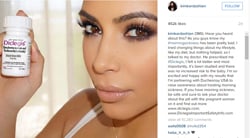 |
| Kim Kardashian promoting Duchesnay's morning sickness drug, Diclegis, on Instagram. |
Reality star Kim Kardashian has a knack for drama. So it's no surprise that she brought a boatload of it to pharma marketing, with an Instagram post that flouted FDA social media guidance.
The now infamous Kardashian "OMG, have you heard about this?" post for Duchesnay's anti-nausea drug Diclegis failed to mention any side effects, simply using a link to the drug's risks instead. The post brought the ire of the FDA and inspired a range of pundits to pronounce it a failure--or, conversely, a success despite the crackdown.
On one hand, the original post garnered more than 460,000 likes and social media conversations about the drug skyrocketed--up more than 500% by Treato's account. Widespread media coverage by very non-pharma pubs like Huffington Post, TMZ , Harper's Bazaar and New York Magazine raised brand awareness of Diclegis among an audience that had likely never heard of it.
On the other hand, Duchesnay scored a serious warning letter from the FDA, demanding corrective action. The letter specifically requires the company to create a corrective message that reaches the same audience attracted by the original "volatile promotional material." Kardashian is a paid spokesperson, but will she be willing to rescind and correct the original post on her social media channels? And if not, how much money might Duchesnay have to shell out to reach a half-million folks for corrective ads?
Some media labeled it a fail--O'Dwyer's asked "What in the world was drugmaker Duchesnay thinking when it tapped social media hound Kim Kardashian?" while Advertising Age called it an "endorsement fail" adding that "a short-term awareness boost isn't worth the long-term risk." Others took the "any press is good press" side – Adweek's headline declared: "FDA rebukes Kim Kardashian for morning-sickness drug ad on Instagram but pharma marketer Duchesnay wins big anyway."
Yet, whether you think Duchesnay scored or failed, the bigger question for pharma marketing is what's the fallout for everyone else. Will the FDA's harsh treatment create a chilling effect within pharma, making the already cautious group even more afraid to take chances in social media?
We're going with not likely. As Wendy Blackburn, executive VP at InTouch Solutions pointed out, "Anyone familiar with FDA guidance would say 'of course they got a letter, they obviously broke the rules.' … People in the industry who know what they're doing will just look at it as someone screwed up and didn't include the risks."
She added, "It's so incredibly blatant that it almost seems deliberate."
Will it bring stronger scrutiny by the FDA? Again, unlikely. An FDA spokeswoman was by-the-book about what it expects and will continue to expect, saying, via email, "We note that the FDA's draft guidances for social media recommend, regardless of the platform, that product manufacturers (and their representatives) that choose to present benefit information should present both benefit and risk information to best serve the public health."
One unwelcome--and potentially widespread--effect, however, could be that social media channels eye pharma communications more warily. A Slate article contended that social media venues themselves "not the government--should restrict pharmaceutical advertisements." The article states in part, "These are private companies we're talking about; they have no obligation to let drug companies advertise in their space. (In fact, they likely have a First Amendment right to exclude information or advertising they dislike.) Ads like these only make social media sites less trustworthy, spammier places to be."
What happens next in this specific Kardashian case is up to Duchesnay. The FDA spokeswoman said that the letter is clear about what the drugmaker needs to file by the August 21 deadline. Any future FDA action depends on what Duchesnay does, or doesn't, do regarding the requested corrective action.
- read O'Dwyer's
- follow Ad Age coverage
- see what Adweek wrote
- note Slate's take
Special Report: Top 10 pharma companies in social media